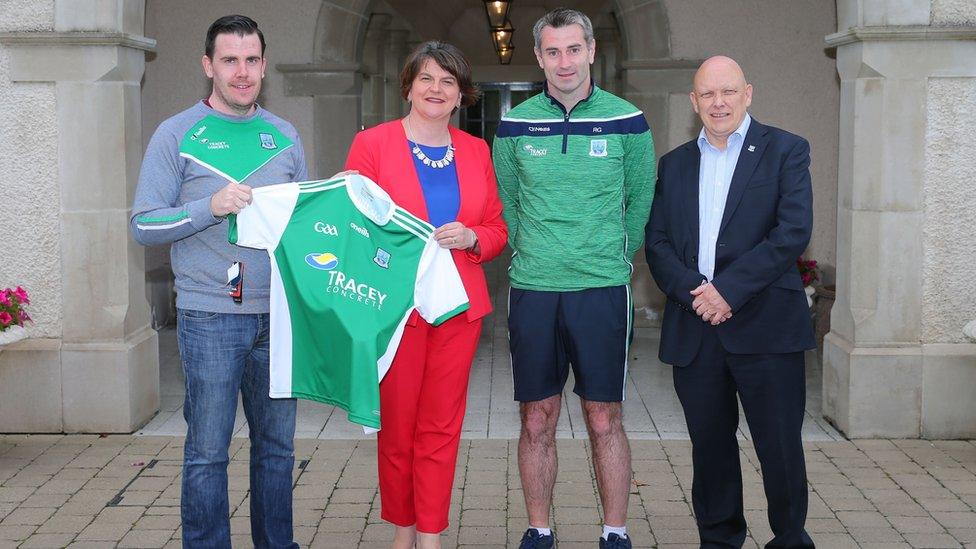Arlene Foster says GAA match was 'a significant step'
- Published
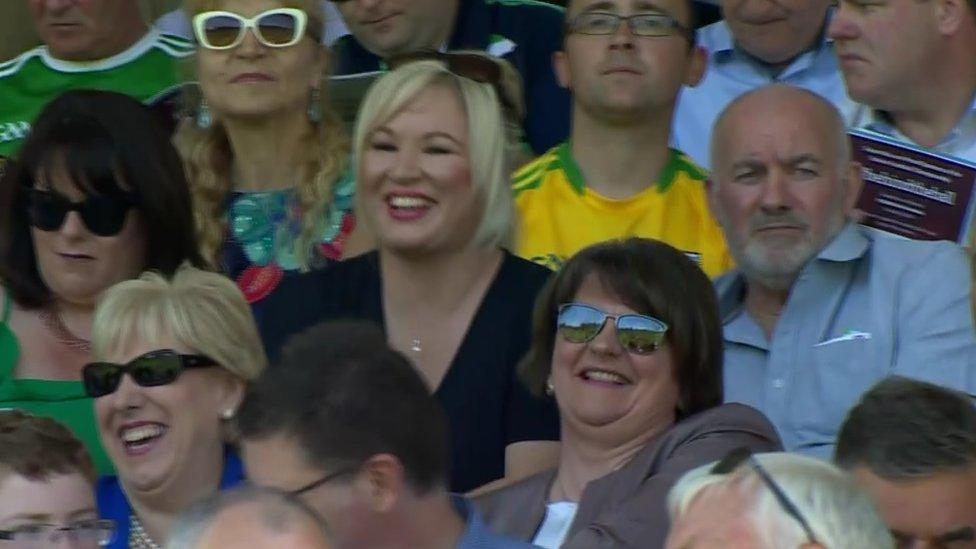
Arlene Foster chatted with Sinn Féin's Michelle O'Neill during Sunday's match
The Democratic Unionist Party (DUP) leader has described her attendance at a Gaelic games match as a "significant step" towards a shared society.
Arlene Foster said she received a "very warm welcome" from Gaelic Athletic Association (GAA) fans and officials at the Ulster Football Final on Sunday.
"As a political leader, sometimes we have to do things that we wouldn't be comfortable with, ordinarily.
"I have to say, I think I made the right decision." she told the BBC.
Mrs Foster is from Fermanagh. The team lost to Donegal in the match with a final score of Donegal 2-18 Fermanagh 0-12.
Mrs Foster travelled to Clones, County Monaghan for the final, becoming the first DUP leader to cross the Irish border to attend a GAA match.
She stood for the Irish national anthem and took her seat in the stands close to Sinn Féin's deputy leader, Michelle O'Neill.
DUP leader Arlene Foster said she "thought long and hard" before attending the game
Speaking to the BBC's Good Morning Ulster programme, Mrs Foster said she found the match "interesting" and thanked the GAA's Ulster Council for the welcome she received.
'Reaching out'
She explained that she "thought long and hard" before decided to go, and took pastoral advice from her bishop about attending such an event on a Sunday.
"I did recognise that there are those who are supporters of my party who would not be comfortable with that for a number of reasons, not least the fact that the Ulster GAA final is played on a Sunday and it's not the normal thing that I would be at on a Sunday," she said.
However, she added that she was leading "a political party that wants to have a shared future for everybody in Northern Ireland".
She said she believed that would help to secure the union between Northern Ireland and Great Britain.
Mrs Foster was asked if she was on "a charm offensive", given that she has recently met the County Fermanagh GAA team, attended a Muslim festival and is shortly due to attend an LGBT event.

Arlene Foster attended a Muslim festival in Belfast earlier this month
"I hope it's not an offensive," she replied.
"I hope it's recognised for what it is - and that is a genuine reaching out from someone who is looking to the future, who wants to build a Northern Ireland where everybody feels comfortable; where our children feel that they can identify as Irish and British, as Northern Irish and British or just as British.
"That's what I want to build - a Northern Ireland where everybody feels comfortable and where everybody wants to co-exist together.
"That's my vision for Northern Ireland and I know that it is shared by many people judging by the reaction that I have had over the weekend."
DUP leader stands for Irish national anthem at GAA match
IRA names
However, Mrs Foster also suggested the GAA could do more to help unionists feel more comfortable getting involved in its sports.
"I hope as well that we can start a conversation with the GAA about a number of different areas - not least the whole issue of why it is that unionists feel that there is a barrier between the GAA and themselves
"And of course that comes down to issues such as naming grounds after former IRA members and trophies being named after IRA members."
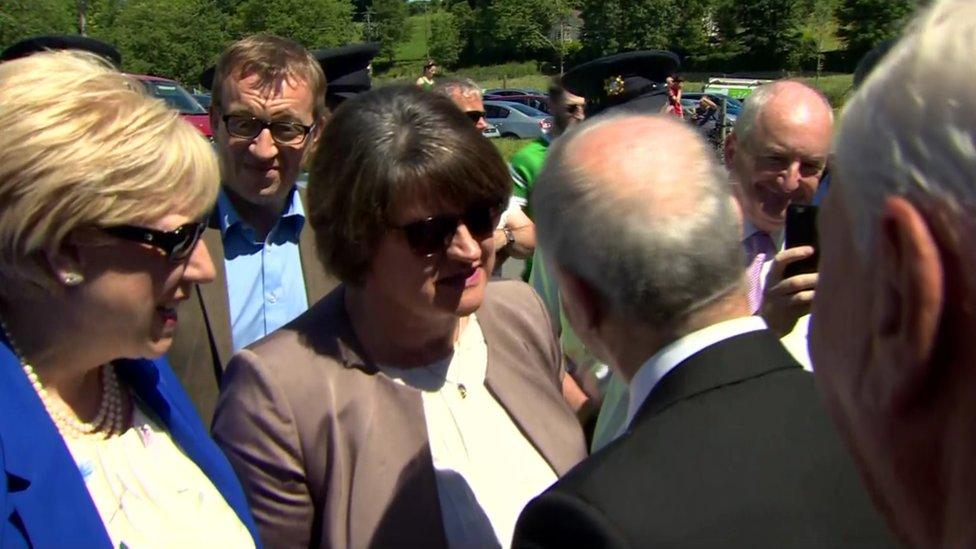
Arlene Foster was accompanied by Irish Minister for Business Heather Humphreys
Ulster GAA's chief executive, Brian McEvoy, acknowledged that a number of grounds were historically named in memory of IRA men but he argued that was because the GAA's "history is embedded" in a wider political movement.
"It has never stated that it is only a sporting organisation," he told Good Morning Ulster.
"From day one, it has been a sporting and cultural organisation, that is the way it has been from 1884 and that is the way it is today."
'Soul-searching'
The chief executive said like any other organisation, the GAA's first priority was to its own membership, but it could still be accommodating and had shown this by welcoming the DUP delegation.
He described Mrs Foster's visit as a "very symbolic day" and acknowledged that it had taken "a lot of soul-searching" on her part.
"While its not up to the GAA, it's really up to politicians to work through the issues that led us in to the current impasse," Mr McEvoy said.
"But as an organisation I feel that we are willing to play out part and I think we have a responsibility to play our part in helping to create the conditions which may enhance the prospects of reaching an accommodation."
- Published24 June 2018
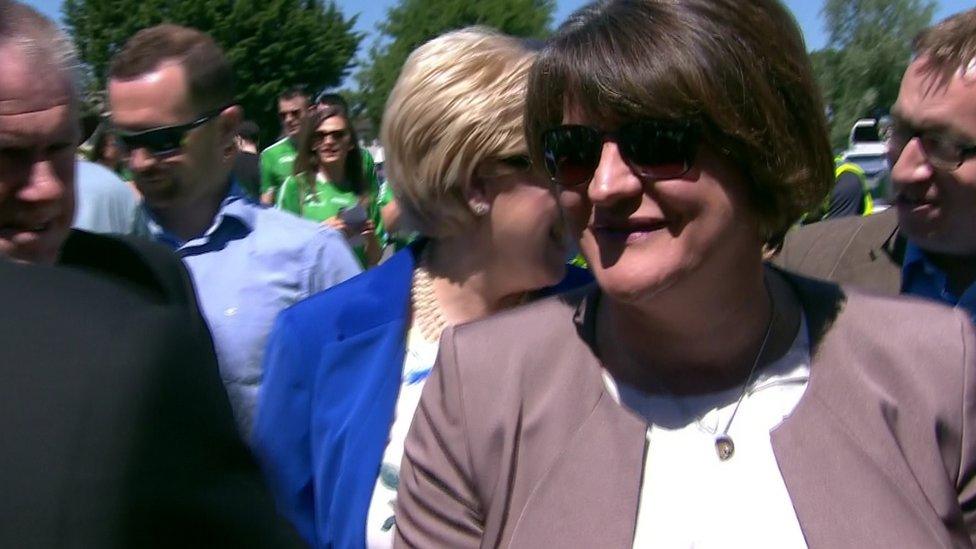
- Published24 June 2018
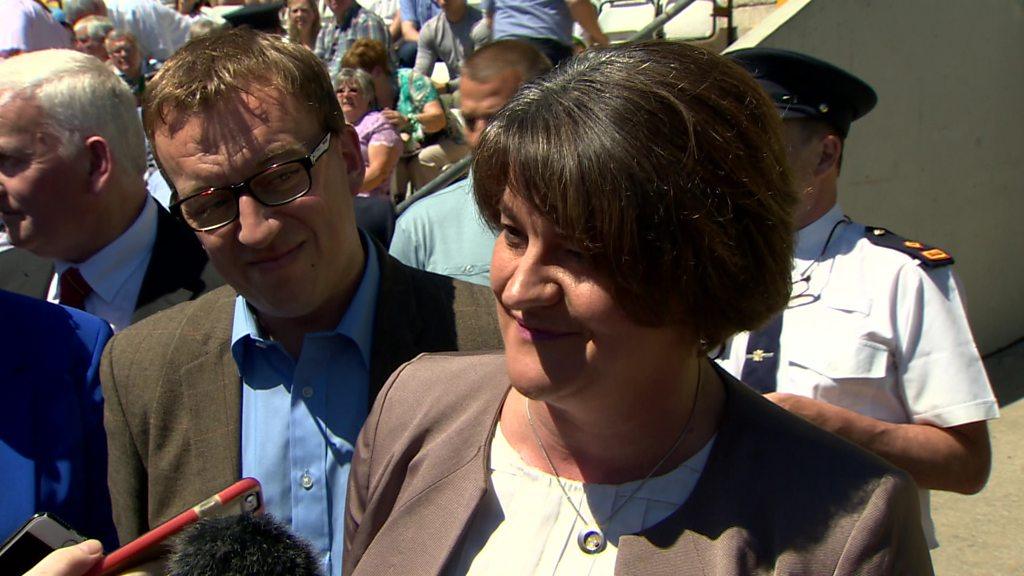
- Published16 June 2018
